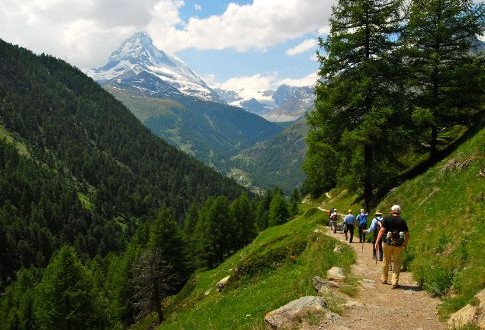Taking easy is very important when hiking or ascending high mountains. It is understandable that you are eager to hit the slopes but take it slowly. Over exerting yourself will only make it harder to adjust to the elevation. Try a low impact activity on your first day, such as hiking up much lower mountain. There are many mountains around Zermatt that you can get used to high altitudes. Even going up one of the high mountain by gondolas or going up to the high pistes can do the job. But if you are planning to go up a rather difficult mountain such as the Matterhorn, there are many mountains around where you can acclimatize and train your body.
Hold the beer. Alcohol and tobacco can impact your body’s ability to absorb oxygen. Of course, it is hard not to indulge yourself when you’re in beautiful resort such as Zermatt but if you’re planning to go up high in the mountains, try to hold it for a while. You can enjoy a nice wine or Valais beer once you’re done hiking up.
Taking vitamins sometimes helps too. It has been shown that taking iron supplements makes it easier to perform activities at high elevation. But be sure to consult a doctor first. Ginkgo Biloba, an inexpensive herbal supplement used for mental clarity and increased circulation, has been proven to speed acclimatization to altitude and lessen the effects of acute mountain sickness in several clinical and on local studies, without incurring any of the side effects of Diamox. Recommended dosage is 120mg per day, two weeks before arriving at altitude, then 120mg per day while at altitude. There are other supplements that can be taken to help acclimatized to the height.
Look out for the symptoms of altitude sickness. 20% of people develop mild symptoms at altitudes between 1920 to 2960 meters or 6300 to 9700 feet. If you know you’re getting enough water, the symptoms of altitude sickness will manifest themselves about 6 to 10 hours after ascent over 2000 meters or 6500 feet above sea level and are comparable to those of severe hangover. Be sure to check for loss of appetite, nausea or vomiting, fatigue or weakness, dizziness or light-headedness, insomnia, shortness of breath upon exertion, persistent rapid pulse, drowsiness, swelling of hands, feet and face. By looking out for these symptoms, you can quickly go to a lower altitude or treat it quickly. If you or your partner get any of these symptoms, it is wise to stop and rest, get plenty of fluids and if necessary drink Tylenol or Advil for headache.
If you see any of life threatening symptoms such as persistent dry cough, fever, shortness of breath even when resting, headache that does not respond to drugs, unsteady walking, increasing vomit, or gradual loss of consciousness, you should get emergency treatment quickly. Extreme altitude sickness can result in fatal conditions like high altitude pulmonary edema which lungs gets filled with fluid, and high altitude cerebral edema which is swelling of the brain. Both occur up to 2% of people adjusting to altitudes above 2700 meters or 9000 feet. Try to stay calm and if you or your partner who has the symptoms can walk, descend to a lower elevation and work your way back to the resort slowly. If the person with the symptoms is unconscious, be sure to get help. Be sure to have the emergency numbers written or saved on your phone. High altitude sickness, if not severe, should go away within a day so if you get any of the small symptoms, do not avoid them and be sure to take it easy.

